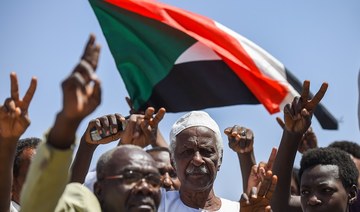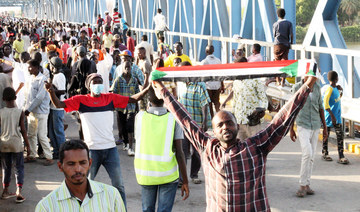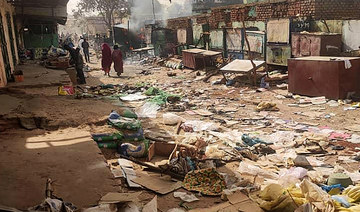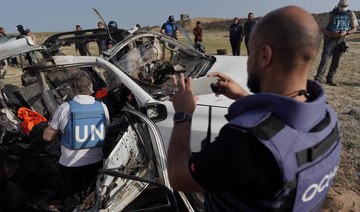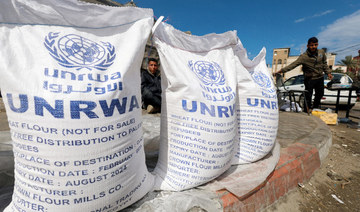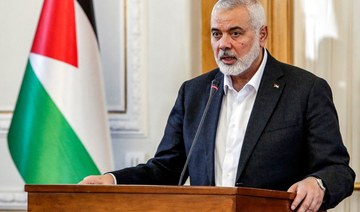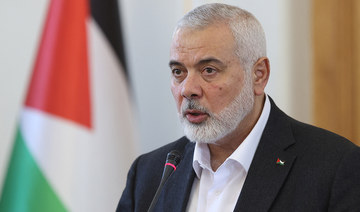KHARTOUM: Sudanese protesters voiced regret Thursday at an army decision to suspend crucial talks on installing civilian rule but vowed to press on with a sit-in despite being targeted in fresh violence.
Army generals and protest leaders had been expected to come to an agreement on Wednesday over the make-up of a new body to govern Sudan for three years.
The issue is the thorniest to have come up in ongoing talks on reinstating civilian rule after the generals took over following the ouster of longtime autocratic president Omar Al-Bashir last month.
But in the early hours of Thursday, the chief of Sudan’s ruling military council, General Abdel Fattah Al-Burhan, announced the talks had been suspended for 72 hours as security in Khartoum had deteriorated.
He demanded that protesters dismantle roadblocks in Khartoum, open bridges and railway lines connecting the capital and “stop provoking security forces.”
The Alliance for Freedom and Change, the group leading the protest movement and negotiating the transfer of power with the army rulers, called the move “regrettable.”
“It ignores the developments achieved in negotiations so far... and the fact that Wednesday’s meeting was to finalize the agreement, which would have stopped the escalations such as roadblocks.”
The protest movement vowed to press on with the sit-in and called on its supporters to launch rallies heading to the protest camp later on Thursday after breaking the Ramadan fast.
Protesters said the army was trying to provoke them.
“They want to provoke the people by delaying the negotiations... but the negotiations will resume now that the roadblocks have been removed,” said Moatassim Sayid, a protester at the sit-in.
On Thursday morning, several roadblocks in downtown Khartoum had been taken down, an AFP correspondent reported, adding that troops from the paramilitary Rapid Support Force (RSF) were deployed in some areas.
Roadblocks on key thoroughfares are being used by demonstrators to pressure the generals to transfer power to a civilian administration.
The talks began on Monday and achieved significant breakthroughs, but have also been marred by violence that left five protesters and an army major dead and many wounded from gunshots.
Protesters allege that members of RSF were behind the violence.
But Burhan said there were “armed elements among demonstrators who were shooting at security forces.”
He defended the paramilitary group, saying “it had taken the side of the people” during the uprising that toppled Bashir on April 11.
The British ambassador to Khartoum said Sudanese security forces had fired at protesters on Wednesday when eight were reported wounded near the sit-in, where thousands remain camped demanding the generals step down.
“Extremely concerned by use of live ammunition by Sudanese security forces against protesters in Khartoum today, with reports of civilian casualties,” Irfan Siddiq wrote on Twitter on Wednesday.
Washington blamed the generals for the bloodshed that left six dead on Monday.
“The tragic attacks on protesters... were clearly the result of the Transitional Military Council trying to impose its will on the protesters by attempting to remove roadblocks,” the US embassy said.
The French foreign ministry urged the two sides to resume the dialogue “to establish a transitional civilian government” and to “preserve the peaceful nature of the transition.”
The protest movement said the generals wanted the demonstrators to restrict themselves to the sit-in area.
Protesters are demanding a civilian-led transition, which the generals have steadfastly resisted since bowing to their demands and toppling Bashir.
During the first two days of talks the two sides had agreed on an overall civilian structure, including a three-year period for the full transfer of power to a civilian administration.
They had also agreed that parliament be composed of 300 members for the transition, with around two-thirds from the alliance and the rest drawn from other political groups.
The make-up of the new sovereign council has been the toughest part of the negotiations, with the two sides so far proposing different compositions of the body which is expected to take all key decisions concerning national issues.
The generals want it to be military-led, while the protesters insist on a majority civilian body.
General Yasser Al-Atta, one of the members of the current ruling military council, had vowed earlier this week to reach a deal by Thursday that “meets the people’s aspirations.”
The new council is expected to form a transitional civilian government, which would then prepare for the first post-Bashir election after the three-year changeover period ends.
Sudan protesters vow to press on after talks suspended
Sudan protesters vow to press on after talks suspended
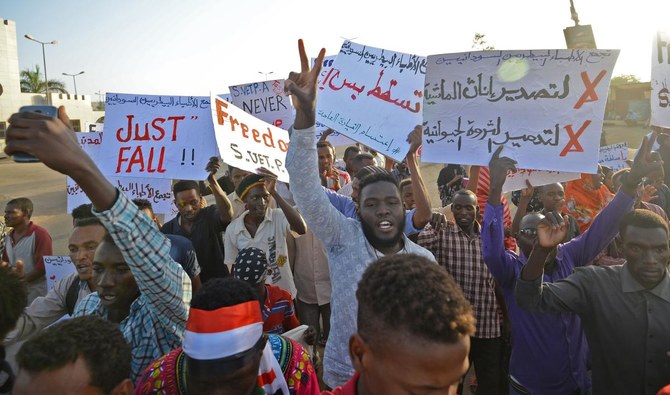
UN warns of new flashpoint in Sudan’s Darfur region
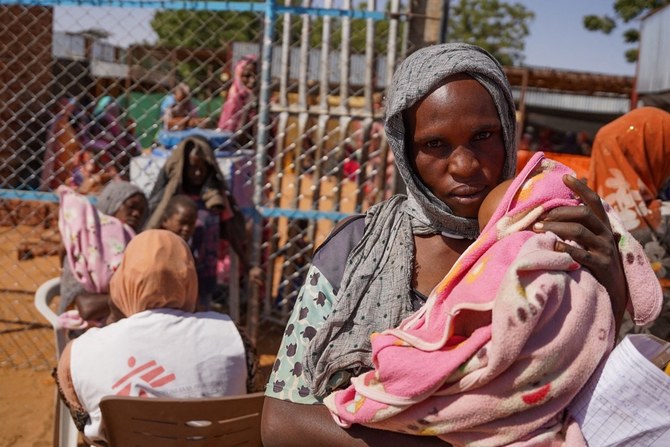
United Nations, US: Senior UN officials warned the Security Council on Friday of the risks of a new front opening in Sudan, around the town of el-Fasher in Darfur, where the population is already on the brink of starvation.
After a year of war between the armed forces (SAF) of General Abdel Fattah Al-Burhan and the paramilitaries of the Rapid Support Forces (FSR), under the command of General Mohamed Hamdan Dagalo, the country is experiencing “a crisis of epic proportions... wholly man-made,” denounced Rosemary DiCarlo, UN under-secretary-general for political and peacebuilding affairs.
“The warring parties have ignored repeated calls to cease their hostilities... Instead, they have stepped up preparations for further fighting, with both the SAF and the RSF continuing their campaigns to recruit civilians,” DiCarlo said.
In particular, she voiced concern at reports of a possible “imminent” attack by the RSF on el-Fasher, the only capital of the five Darfur states it does not control, “raising the specter of a new front in the conflict.”
El-Fasher acts as a humanitarian hub for Darfur, which is home to around a quarter of Sudan’s 48 million inhabitants.
Until recently, the town had been relatively unaffected by the fighting, hosting a large number of refugees. But since mid-April, bombardments and clashes have been reported in the surrounding villages.
“Since then, there have been continuing reports of clashes in the eastern and northern parts of the city, resulting in more than 36,000 people displaced,” said Edem Wosornu, a director at for the UN’s Office for the Coordination of Humanitarian Affairs, noting that Doctors Without Borders has treated more than 100 casualties in el-Facher in recent days.
“The total number of civilian casualties is likely much higher.”
“The violence poses an extreme and immediate danger to the 800,000 civilians who reside in el-Fasher. And it risks triggering further violence in other parts of Darfur,” she warned.
DiCarlo added that fighting in el-Fasher “could unleash bloody intercommunal strife throughout Darfur” and further hamper the distribution of humanitarian aid in a region “already on the brink of famine.”
The region was already ravaged more than 20 years ago by the scorched-earth policy carried out by the Janjaweed — Arab militiamen who have since joined the RSF — for then-president Omar Al-Bashir.
The new conflict in Sudan, which began on April 15, 2023, has already claimed thousands of lives and displaced more than 8.5 million people, according to the UN.
US says UN World Food Programme has agreed to help in distribution of aid to Gaza via sea route

- US officials say they were working with WFP on how to deliver the aid to Palestinian civilians “in an independent, neutral, and impartial manner”
- The NGO group World Central Kitchen stopped its aid distribution work after an Israeli attack killed seven aid workers on April 1
WASHINGTON: The UN World Food Programme has agreed to help deliver aid for the starving civilians of Gaza once the US military completes a pier for transporting the humanitarian assistance by sea, US officials said Friday.
The involvement of the UN agency could help resolve one of the major obstacles facing the US-planned project — the reluctance of aid groups to handle on-the-ground distribution of food and other badly needed goods in Gaza absent significant changes by Israel.
An Israeli military attack April 1 that killed seven aid workers from the World Central Kitchen intensified international criticism of Israel for failing to provide security for humanitarian workers or allow adequate amounts of aid across its land borders.
President Joe Biden, himself facing criticism over the humanitarian crisis in Gaza while supporting Israel’s military campaign against Hamas, announced March 8 that the US military would build the temporary pier and causeway, as an alternative to the land routes.
The US Agency for International Development confirmed to The Associated Press that it would partner with the WFP on delivering humanitarian assistance to Gaza via the maritime corridor.
“This is a complex operation that requires coordination between many partners, and our conversations are ongoing. Throughout Gaza, the safety and security of humanitarian actors is critical to the delivery of assistance, and we continue to advocate for measures that will give humanitarians greater assurances,” USAID said in its statement to the AP.
US and WFP officials were working on how to deliver the aid to Palestinian civilians “in an independent, neutral, and impartial manner,” the agency said.
There was no immediate comment from the WFP, and an WFP spokesperson did not immediately return a request for comment.
Israel promised to open more border crossings into Gaza and increase the flow of aid after its drone strikes killed the seven aid workers, who were delivering food into the Palestinian territory.

The war was sparked when Hamas militants attacked southern Israel on Oct. 7, killing about 1,200 people and taking some 250 others hostage. The Israeli offensive in Gaza, aimed at destroying Hamas, has caused widespread devastation and killed over 33,800 people, according to local health officials. Hundreds of UN and other humanitarian workers are among those killed by Israeli strikes.
International officials say famine is imminent in northern Gaza, where 70 percent of people are experiencing catastrophic hunger.
The US military will be constructing what’s known as a modular causeway as part of the maritime route, in hopes that handling the inspection and processing of the aid offshore will speed the distribution to Gaza’s people.
Offshore, the Army will build a large floating platform where ships can unload pallets of aid. Then the aid will be transferred by Army boats to a motorized string of steel pier or causeway sections that will be anchored to the shore.
Several Army vessels and Miliary Sealift Command ships are already in the Mediterranean Sea, and are working to prepare and build the platform and pier.
That pier is expected to be as much as 1,800 feet (550 meters) long, with two lanes, and the Pentagon has said it could accommodate the delivery of more than 2 million meals a day for Gaza residents.
Army Col. Sam Miller, commander of the 7th Transportation Brigade, which is in charge of building the pier, said about 500 of his soldiers will participate in the mission. All together, Pentagon officials have said about 1,000 US troops will be involved.
Air Force Maj. Gen. Pat Ryder, Pentagon press secretary, told reporters this week that the US in on track to have the system in place by the end of the month or early May. The actual construction of the pier had been on hold as US and international officials hammered out agreements for the collection and distribution of the aid.
He said the US has been making progress, and that Israel has agreed to provide security on the shore. The White House has made clear that there will be no US troops on the ground in Gaza, so while they will be constructing elements of the pier they will not transport aid onto the shore.
US Navy ships and the Army vessels will provide security for US forces building the pier.
Hamas chief Haniyeh arrives in Turkiye for talks
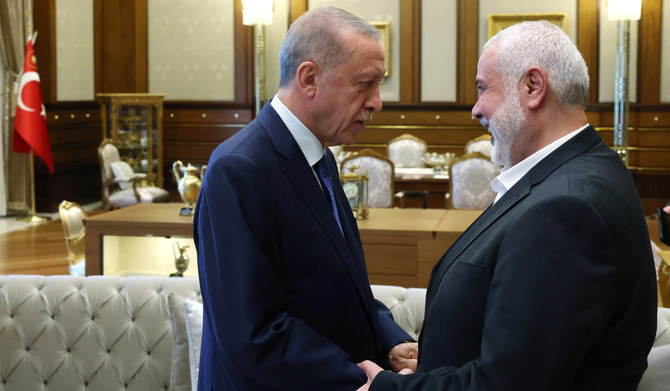
- Fidan said he spoke with Haniyeh, who lives in Qatar, about how Hamas — designated as a terrorist organization by Israel, the United States and the European Union — “must clearly express its expectations, especially about a two-state solution”
ISTANBUL: A leader of Palestinian militant group Hamas, Ismail Haniyeh, arrived in Istanbul Friday evening for talks with Turkish President Recep Tayyip Erdogan as the death toll in Gaza passed 34,000.
A statement from Hamas Friday said Erdogan and Haniyeh would discuss the conflict in Gaza, adding that the head of the group’s political bureau was accompanied by a delegation.
Middle East tensions are at a high after Israel’s reported attack on Iran and Gaza bracing for a new Israeli offensive.
Erdogan insisted on Wednesday that he would continue “to defend the Palestinian struggle and to be the voice of the oppressed Palestinian people.”
But talking to journalists on Friday, he refused to be drawn on the details on the meeting.
Turkish Foreign Minister Hakan Fidan was in Qatar Wednesday and said he spent three hours with Haniyeh and his aides for “a wide exchange of views in particular about negotiations for a ceasefire.”
Qatar, a mediator between Israel and Hamas, acknowledged Wednesday that negotiations to end hostilities in Gaza and liberate hostages were “stalling.”
Fidan said he spoke with Haniyeh, who lives in Qatar, about how Hamas — designated as a terrorist organization by Israel, the United States and the European Union — “must clearly express its expectations, especially about a two-state solution.”
Erdogan’s last meeting with Haniyeh was in July 2023 when Erdogan hosted him and Palestinian president Mahmud Abbas at the presidential palace in Ankara. Haniyeh had last met Fidan in Turkiye on January 2.
The war in Gaza started after Hamas’s unprecedented attack on Israel on October 7 that resulted in the deaths of about 1,170 people, mainly civilians, according to an AFP tally of official Israeli figures.
Militants also took about 250 hostages. Israel says around 129 are believed to be held in Gaza, including 34 presumed dead.
Israel’s retaliatory military campaign has killed at least 34,012 people, mostly women and children, according to Gaza’s Hamas-run health ministry.
Huge blast at military base used by Iraqi Popular Mobilization Forces, sources say

- PMF sources said the strikes targeted a headquarters of the PMF at the Kalso military base near the town of Iskandariya around 50 km south of Baghdad
BAGHDAD: A huge blast rocked a military base used by Iraq’s Popular Mobilization Forces (PMF) to the south of Baghdad late on Friday, two PMF and two security sources told Reuters.
The two security sources said the blast was a result of an unknown airstrike, which happened around midnight Friday.
The two PMF sources pointed out the strikes did not lead to casualties but caused material damage.
PMF sources said the strikes targeted a headquarters of the PMF at the Kalso military base near the town of Iskandariya around 50 km south of Baghdad.
Government officials did not immediately respond to a Reuters request for comment.
The PMF started out as a grouping of armed factions, many close to Iran, that was later recognized as a formal security force by Iraqi authorities.
Factions within the PMF took part in months of rocket and drone attacks on US forces in Iraq amid Israel’s Gaza campaign but ceased to do so in February.
Leaders of Jordan and Pakistan call UAE president to express concern about effects of severe storm

- Leaders passed on their best wishes to the country as it recovers from the storms
DUBAI: The president of the UAE, Sheikh Mohammed bin Zayed Al-Nahyan, received telephone calls from King Abdullah of Jordan and Pakistan’s Prime Minister Shehbaz Sharif on Friday, during which they expressed concern about the effects of the severe weather, including unusually heavy rainfall, that battered parts of the country this week.
They also passed on their best wishes to the country as it recovers from the storms and “conveyed their heartfelt hopes for the safety and prosperity of the UAE and its people, praying for their protection from any harm,” the Emirates News Agency reported.
Sheikh Mohammed thanked both leaders for their warm sentiments, and emphasized the strong bonds between the UAE and their nations.
The UAE and neighboring Oman were hit by unprecedented rainfall and flooding on Tuesday, with more than 250 millimeters of rain falling in parts of the Emirates, considerably more than is normally seen in a year. Dubai International Airport was forced to close temporarily when runways were flooded.




